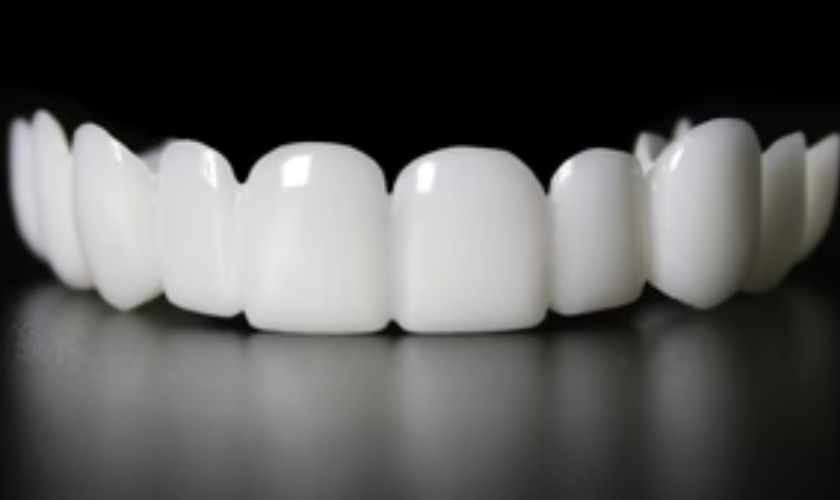(703) 372-5665
The Eco-Friendly Side Of Porcelain Veneers: A Sustainable Smile

The Eco-Friendly Side Of Porcelain Veneers: A Sustainable Smile
In an era where environmental consciousness is increasingly important, people are searching for eco-friendly options in every aspect of life—from the food they eat to the products they use. Dental care is no exception.
If you're considering a cosmetic dental treatment like porcelain veneers, you may wonder if it's possible to achieve the smile of your dreams while staying mindful of your environmental impact.
The good news is that these types of veneers offer a surprisingly eco-friendly solution to smile enhancement. Not only do they provide long-lasting cosmetic benefits, but they also have a smaller ecological footprint compared to other materials.
Today’s blog will reveal the sustainable side of porcelain veneers, from their production process to their lasting environmental benefits.
Porcelain Veneers
Porcelain veneers are thin shells made from medical-grade porcelain that are custom-fitted to the front surface of your teeth. They are designed to improve the appearance of teeth by covering imperfections like chips, discoloration, and misalignment. They are popular for their natural look, durability, and stain resistance.
But beyond aesthetics, these veneers can also contribute to a sustainable lifestyle due to their material properties, longevity, and low environmental impact.
The Eco-Friendly Benefits of Porcelain Veneers
When considering the sustainability of dental products, several factors come into play, including the production process, durability, and maintenance. Here’s how porcelain veneers meet eco-friendly standards:
1. Durability
One of the key factors contributing to the eco-friendly nature of porcelain veneers is their durability. Porcelain veneers typically last anywhere from 10 to 15 years or even longer with proper care. This reduces the need for frequent replacements and minimizes waste, making them a long-term investment in both your smile and the environment.
- Less Frequent Replacement: Unlike some dental treatments that require regular replacements, porcelain veneers are built to last, reducing the waste generated from short-term cosmetic fixes.
- Sustainable Materials: Medical-grade porcelain is a strong, durable material that mimics the appearance and strength of natural teeth. It is also biocompatible, meaning it doesn’t harm the surrounding tissue and integrates well with your body.
2. Non-Toxic Materials
Porcelain is a natural material that is safe and non-toxic. Some other dental restorations, particularly those made from composite resins or metals, may contain chemicals or heavy metals that can leach into the environment or your body over time.
Porcelain veneers, on the other hand, are free from harmful toxins and metals, making them a more eco-friendly and health-conscious option.
- No Harmful Chemicals: Porcelain veneers do not contain BPA, phthalates, or other synthetic chemicals found in some dental composites.
- Biocompatibility: Being biocompatible means these veneers do not produce harmful side effects for the patient or the environment.
3. Lower Resource Consumption
The production and maintenance of porcelain veneers consume fewer resources over time compared to alternative treatments. Here’s why:
- Reduced Energy Use: Because of their durability, these veneers require less energy in the long run, as they don’t need to be replaced as frequently as other dental options.
- Minimal Material Waste: Porcelain veneers are custom-made to fit each patient’s teeth precisely, which means that very little material goes to waste during their production.
- Low Maintenance: Porcelain veneers are low maintenance compared to other materials. They are stain-resistant and easy to clean, reducing the need for harsh cleaning chemicals or specialized products that can have a negative environmental impact.
The Environmental Impact of Traditional Veneers vs. Porcelain Veneers
Not all dental veneers are created equal when it comes to sustainability. Traditional composite veneers, for instance, tend to have a shorter lifespan and may need to be replaced more frequently. This leads to greater waste production and more resources being consumed over time.
Traditional Composite Veneers
- Shorter Lifespan: Composite veneers last 5 to 7 years on average, requiring more frequent replacements.
- Higher Waste Generation: Replacing composite veneers regularly generates more waste and requires more materials.
- Chemical Composition: Some composite materials may contain synthetic chemicals that could potentially harm the environment.
Porcelain Veneers
- Longer Lifespan: They last 10 to 15 years or more, reducing the frequency of replacements and associated waste.
- Minimal Environmental Impact: The non-toxic, durable nature of porcelain makes it a more sustainable option.
How Do Porcelain Veneers Reduce Long-Term Dental Procedures?
Another aspect of the eco-friendliness of porcelain veneers is their ability to prevent the need for future dental procedures. By protecting the surface of your teeth and preventing further damage, veneers can help you avoid more invasive treatments down the road.
- Prevention of Future Damage: They can protect damaged or weakened teeth, preventing the need for root canals, crowns, or extractions later in life. This helps reduce the overall environmental impact of more complex dental procedures.
- Saves Resources: Every avoided dental treatment means less energy, fewer materials, and lower environmental costs associated with additional procedures.
A Sustainable Smile: Care and Maintenance
To maximize the eco-friendly benefits of porcelain veneers, it’s essential to take good care of them. Proper maintenance ensures they last as long as possible, minimizing the need for replacement or repair.
Here are some care tips:
- Use a Soft-Bristled Toothbrush: Brushing twice daily with a soft-bristled toothbrush helps maintain the integrity of the veneers without damaging them.
- Non-Abrasive Toothpaste: Opt for non-abrasive toothpaste to avoid scratching the surface of your veneers, ensuring they remain smooth and shiny.
- Regular Dental Visits: Continue to visit your dentist regularly for check-ups and cleanings. This not only protects your veneers but also helps maintain your overall oral health.
- Avoid Staining Agents: While these veneers are stain-resistant, it’s still advisable to avoid excessive consumption of staining agents like coffee, tea, and red wine to keep your veneers looking their best.
Porcelain Veneers as a Sustainable Choice
Porcelain veneers offer a fantastic option for anyone looking to improve their smile while staying eco-conscious. From their long-lasting durability and non-toxic materials to their low maintenance and ability to prevent future dental procedures, these veneers can help you achieve a sustainable smile that’s as kind to the environment as it is to your appearance.
If you’re considering cosmetic dentistry but want to ensure your choices align with your eco-friendly lifestyle, porcelain veneers are an excellent option. They not only provide a beautiful, natural-looking smile but also offer significant environmental benefits over traditional alternatives.
In a world where sustainability is key, porcelain veneers give you the confidence to smile with both style and responsibility.





